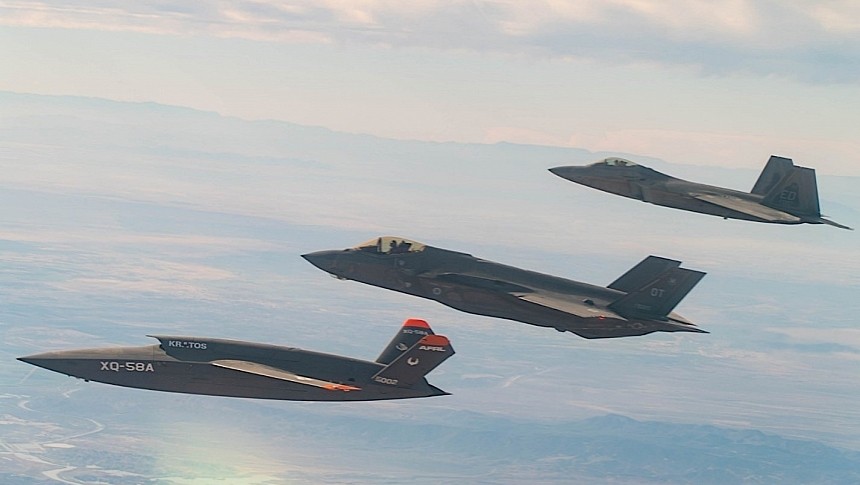One of the best ways to bring down a military drone is to jam its comms and GPS. Since most of these pieces of weaponry still rely on remote control to conduct military operations, disrupting their ability to receive instructions and determine where they are is essential to rendering them useless.
Take Ukraine, for instance, a country that is literally fighting for its life against the Russians. The European conflict, the largest following the Second World War, sees large-scale use of drones by both sides, and that's obvious for everyone going to social media to see what's going on there. But what we see there is only the tip of the iceberg, the successful runs of drones.
The other side of the coin is much darker. According to American defense contractor Kratos, Ukrainian drones are constantly being brought down by Russian electronic warfare. How many of them? Well, in what seems to be a first-time admission of this, Kratos says Ukraine is losing drones at a rate of 10,000 per month.
Kratos is the company presently working on something called the XQ-58A Valkyrie. It's a jet aircraft-like stealth drone that's supposed to aid operations of crewed aircraft like the F-22 and F-35, including by striking deep inside enemy territory.
To make sure the Valkyrie does not fall victim to electronic warfare in case of a conflict, Kratos said last week it is going to give control of the drone to an artificial intelligence pilot, one that doesn't need GPS and communications to do its thing.
The AI system will be based on a technology being developed by Shield AI, an American company working to build the "world's best AI pilot." What exactly the tech will be capable of doing is not public knowledge, but we are promised "quite frankly," it is "going to shock some people."
The Valkyrie should become the first such aircraft to incorporate the AI pilot, but the tech has been tested in a limited way before, including on a quadcopter and an F-16 Fighting Falcon.
The Valkyrie first took flight back in 2019, and has progressed greatly since. Last we heard of it was back in the summer of last year, when two production drones were flown for testing purposes. When fully operational, it should be capable of flying at speeds of 652 mph (1,050 kph), and keep going for as much as 2,449 miles (3,941 km). It can be armed, of course, and can carry Joint Direct Attack Munition (JDAM) and small-diameter bombs.
Kratos is developing the tech to be used primarily by the American military, but an exact time when it should be deployed in active duty is not known. As for price, we're told Kratos machines generally have "actual known cost points of approximately $400,000 to $6.5 million."
The other side of the coin is much darker. According to American defense contractor Kratos, Ukrainian drones are constantly being brought down by Russian electronic warfare. How many of them? Well, in what seems to be a first-time admission of this, Kratos says Ukraine is losing drones at a rate of 10,000 per month.
Kratos is the company presently working on something called the XQ-58A Valkyrie. It's a jet aircraft-like stealth drone that's supposed to aid operations of crewed aircraft like the F-22 and F-35, including by striking deep inside enemy territory.
To make sure the Valkyrie does not fall victim to electronic warfare in case of a conflict, Kratos said last week it is going to give control of the drone to an artificial intelligence pilot, one that doesn't need GPS and communications to do its thing.
The AI system will be based on a technology being developed by Shield AI, an American company working to build the "world's best AI pilot." What exactly the tech will be capable of doing is not public knowledge, but we are promised "quite frankly," it is "going to shock some people."
The Valkyrie should become the first such aircraft to incorporate the AI pilot, but the tech has been tested in a limited way before, including on a quadcopter and an F-16 Fighting Falcon.
The Valkyrie first took flight back in 2019, and has progressed greatly since. Last we heard of it was back in the summer of last year, when two production drones were flown for testing purposes. When fully operational, it should be capable of flying at speeds of 652 mph (1,050 kph), and keep going for as much as 2,449 miles (3,941 km). It can be armed, of course, and can carry Joint Direct Attack Munition (JDAM) and small-diameter bombs.
Kratos is developing the tech to be used primarily by the American military, but an exact time when it should be deployed in active duty is not known. As for price, we're told Kratos machines generally have "actual known cost points of approximately $400,000 to $6.5 million."






